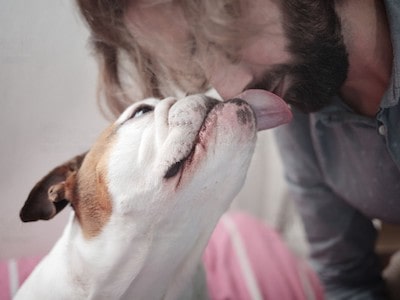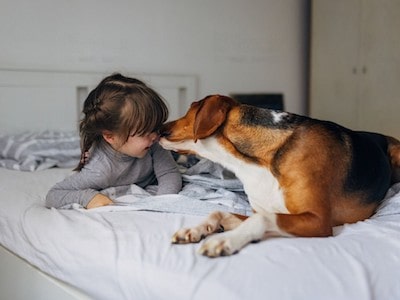Have you ever been left puzzled by your dog biting your nose? Although dogs are usually loyal and loving, they sometimes act in ways that leave us mystified. Nose biting is one such behavior which can be both perplexing and worrying. Luckily, this article will discuss the potential causes of this kind of behavior as well as provide successful solutions to it.

Whether it’s an instinctual behavior or a playful gesture, it’s important to understand why dogs bite our noses. We’ll dive into the different factors that can contribute to nose biting behavior, including attention-seeking, fear, and medical issues. Plus, we’ll cover practical tips to discourage nose biting behavior, such as positive reinforcement techniques, training and socialization, and consulting with professionals.
Gaining insight into the reasons why your pup bites your nose and devising an effective plan of action can help you foster a safe and enjoyable relationship with them. So let’s discover more about this behavior and what we can do to stop it!
Reasons Why Your Dog Bites Your Nose
There are several reasons why dogs may engage in nose biting behavior. Understanding these reasons is key to addressing and preventing this behavior in the future. Here are some common factors that may contribute to nose biting behavior in dogs:

- Instinctual behavior: Dogs have an innate tendency to use their mouths to explore and interact with their environment, including other animals and humans. Nose biting may be a natural extension of this behavior, especially in puppies who are teething and exploring their world.
- Playful behavior: Dogs may also bite noses playfully, as a way to initiate play or show affection. This behavior is usually gentle and non-threatening, but can still be uncomfortable or unwanted for some owners.
- Attention-seeking behavior: Dogs are social creatures and often crave attention and affection from their owners. Nose biting may be a way for them to seek attention, especially if they are feeling neglected or bored.
- Fear and anxiety-related behavior: Dogs may also bite noses out of fear or anxiety, especially if they feel threatened or unsafe. This behavior may be accompanied by other signs of anxiety, such as trembling, hiding, or excessive barking.
- Medical issues: In some cases, nose biting behavior may be a symptom of an underlying medical condition, such as dental problems or skin irritations. If your dog’s nose biting behavior is sudden or unusual, it’s important to consult with a veterinarian to rule out any potential health issues.
- Sensory-related behavior: Dogs rely heavily on their sense of smell to navigate the world around them. Nose biting may be a way for them to explore new scents or gather information about their surroundings.
- Dominance displays: In rare cases, nose biting behavior may be a display of dominance or aggression. This behavior is usually accompanied by other signs of aggression, such as growling, snarling, or biting. If your dog displays aggressive behavior, it’s important to seek professional help from a certified dog behaviorist or trainer.
What Do You Do If Your Dog Bites Your Nose?

If your dog has bitten your nose, the first thing you should do is tend to the wound. Wash the affected area thoroughly with soap and water, and apply a clean bandage if necessary. If the bite is deep or bleeding heavily, seek medical attention from a healthcare professional.
Once you have tended to the wound, it’s important to address the underlying cause of the biting behavior. Here are some steps you can take:
- Identify the trigger: Attempt to discover the cause of your dog biting your nose. Was it simply playful fun that went too far, or did they bite out of fear or apprehension? Knowing what instigated the incident can aid you in preventing similar occurrences in the future.
- Reinforce positive behavior: If your dog refrains from biting your nose, reward them with treats, praise or affection to reinforce the positive behaviour and encourage its repetition.
- Train and socialize your dog: You should enroll your dog in a training or socialization program if its nose biting behavior is becoming an issue, as this will assist them in learning proper conduct and interacting positively with other dogs and people.
- Consult with professionals: Consulting a certified dog behaviorist or trainer may be beneficial if your dog’s nose biting is persistent or severe, as they can identify the source of the problem and devise a tailored solution.
FAQs
Yes, nose biting behavior can be a normal behavior in dogs, especially in puppies who are exploring their world and teething. However, it’s important to distinguish between playful and non-threatening nose biting and more aggressive or dominant biting behavior.
In rare cases, nose biting behavior may be a sign of an underlying medical issue, such as dental problems or skin irritations. If your dog’s nose biting behavior is sudden or unusual, it’s important to consult with a veterinarian to rule out any potential health issues.
Your dog may only bite your nose because they see you as a close companion and are comfortable interacting with you in this way. However, it’s important to address any unwanted nose biting behavior and reinforce positive play behavior.
If your dog’s nose biting is persistent, aggressive, or accompanied by other signs of aggression like growling or snarling, it could be a cause for concern and should be addressed with training and/or professional help if needed.
Looking for the best cat products and advice? Go check out CatLovesBest for all your feline needs.
Conclusion
In conclusion, nose biting behavior in dogs can stem from a variety of reasons, including playfulness, attention-seeking, fear, and sensory exploration. It’s important to assess the context of the behavior and address it appropriately through positive reinforcement training, socialization, and consulting with professionals if necessary.
If your dog bites your nose, tend to the wound immediately and seek medical attention if necessary. By understanding and addressing nose biting behavior in dogs, you can ensure a safe and enjoyable relationship with your furry friend.
Remember, with patience, love, and consistent training, you can help your dog learn appropriate behaviors and enjoy a happy and healthy life together.

Ellis is a retired veterinary technician and full-time contributor at DogLovesBest. He likes writing about pet health care tips and reviews the products that are useful for fidos on a daily basis.
Ellis also guardians a Siberian husky, Nova, and a cat named Shilly. They all live happily with his wife Ammy, and both the dogs on a seaside apartment in Queens, NY.
